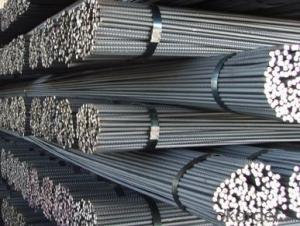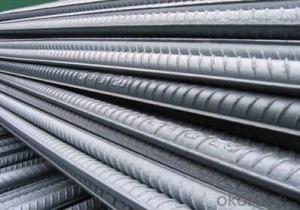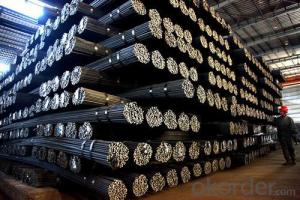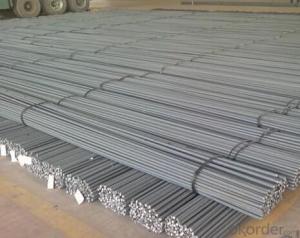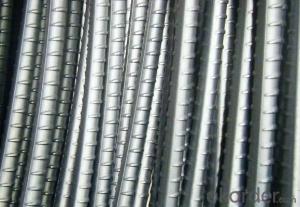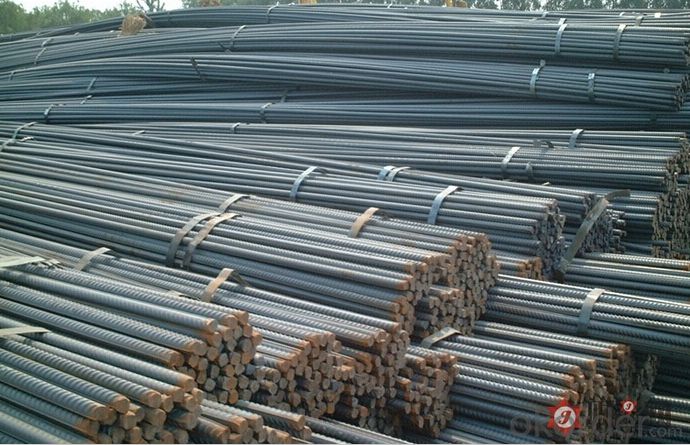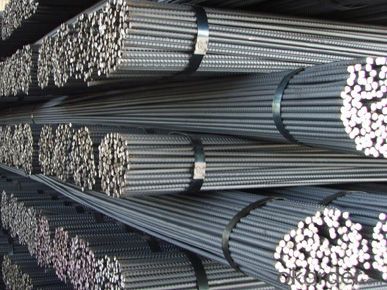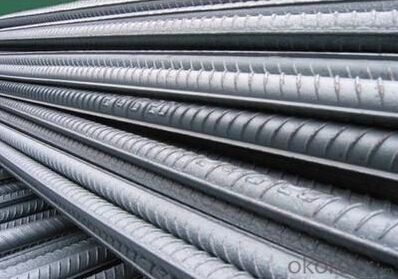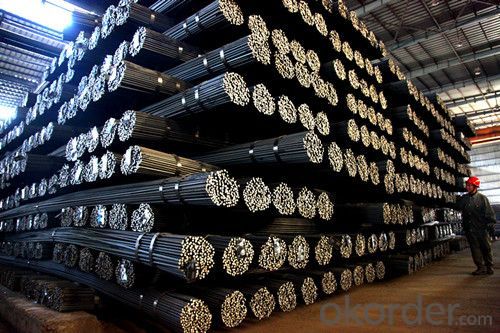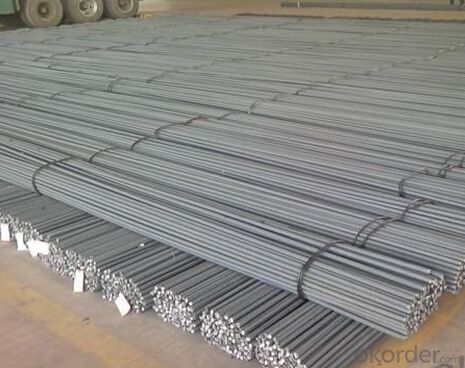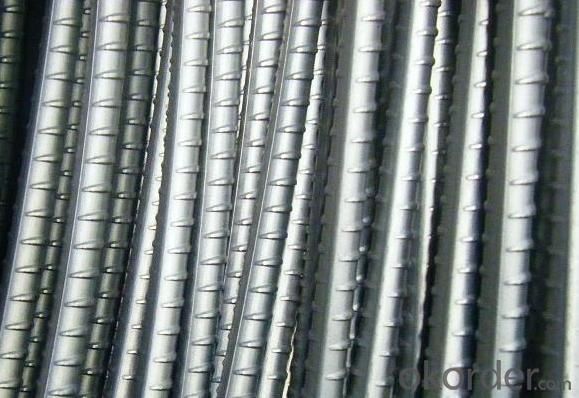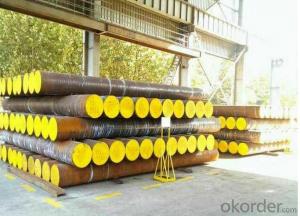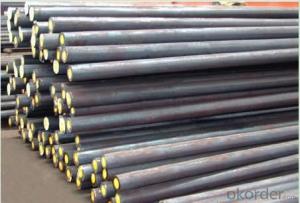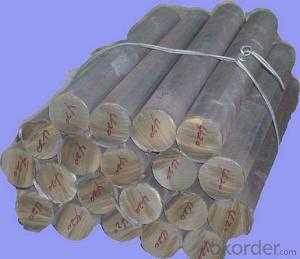Grade HRB400 HRB400E Deformed Steel Bars Prices
- Loading Port:
- Tianjin
- Payment Terms:
- TT or LC
- Min Order Qty:
- 50 m.t.
- Supply Capability:
- 10000 m.t./month
OKorder Service Pledge
OKorder Financial Service
You Might Also Like
Item specifice
Grade HRB400_HRB400E Deformed Steel Bars Prices
Details of Grade HRB400_HRB400E Deformed Steel Bars Prices
Name | Deformed Bar |
Shape | Round Bar |
Standard | 1.GB1499.2-2007, HRB335, HRB400E 2. ASTM A615 Gr.40, Gr.60 3.BS4449/1997 |
Diameter | 6mm-50mm |
Length | 6m, 8m, 9m,12m as standard or as request |
Test | SGS/UT 100% Elements Testing |
Certificate: | ISO/Mill Certificate |
Service: | 24 hours online service / |
more than 20 years trading and manufacture | |
Quality Assurance: | the third party inspection, such as SGS, BV, TUV…etc. is acceptable |
Packaging Details: | Seaworthy Packaging or as per customer's packing instruction |
Specification of Grade HRB400_HRB400E Deformed Steel Bars Prices
Standard | Grade | Yield Strength Mpa | Tensile Strength | Elongation% |
BS4449:1997 | 250 | 250 | 295 | 22 |
460A | 460 | 485 | 12 | |
460B | 460 | 500 | 15 | |
GB1499.2-2007 | HRB335/335E | 335 | 455 | 17 |
HRB400/400E | 400 | 540 | 17 | |
HRB500/500E | 500 | 630 | 16 | |
ASTM A615 & A615M-04a | GRADE40 | 280 | 420 | 12 |
GRADE60 | 420 | 620 | 9 | |
GRADE75 | 520 | 690 | 7 | |
JIS G3112-2004 | SD295A | ≥ 295 | 440-600 | 17 |
SD295B | 295-390 | ≥ 440 | 17 | |
SD345 | 345-440 | ≥490 | 19 | |
SD390 | 390-510 | 560 | 17 | |
SD490 | 490-625 | ≥ 620 | 13 |
Size | WEIGHT | WEIGHT | QUANTITY | ||
LENGTH 6M | LENGTH 12M | LENGTH 6M | LENGTH 12M | ||
6 | 0.222 | 1.332 | 2.664 | 751 | 375 |
8 | 0.395 | 2.37 | 4.74 | 422 | 211 |
10 | 0.617 | 3.702 | 7.404 | 270 | 135 |
12 | 0.888 | 5.328 | 10.656 | 188 | 94 |
14 | 1.21 | 7.26 | 14.52 | 138 | 69 |
16 | 1.58 | 9.48 | 18.96 | 106 | 53 |
18 | 2 | 12 | 24 | 83 | 42 |
20 | 2.47 | 14.82 | 29.64 | 67 | 34 |
22 | 2.98 | 17.88 | 35.76 | 56 | 28 |
25 | 3.85 | 23.1 | 46.2 | 43 | 22 |
28 | 4.83 | 28.98 | 57.96 | 35 | 17 |
32 | 6.31 | 37.86 | 75.72 | 26 | 13 |
36 | 7.99 | 47.94 | 95.88 | 21 | 10 |
40 | 9.87 | 59.22 | 118.44 | 17 | 8 |
50 | 15.42 | 92.52 | 185.04 | 11 | 5 |
CNBM Introduction of Grade HRB400_HRB400E Deformed Steel Bars Prices
CNBM International Corporation is the most import and export platform of CNBM group(China National Building Material Group Corporation) ,which is a state-owned enterprise, ranked in 270th of Fortune Global 500 in 2015.
With its advantages, CNBM International are mainly concentrate on Cement, Glass, Iron and Steel, Ceramics industries and devotes herself for supplying high quality series of refractories as well as technical consultancies and logistics solution.
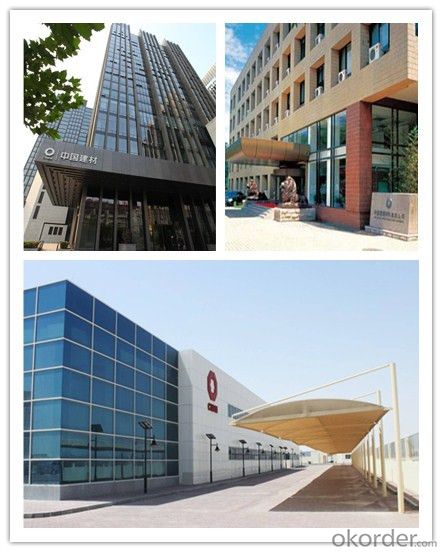
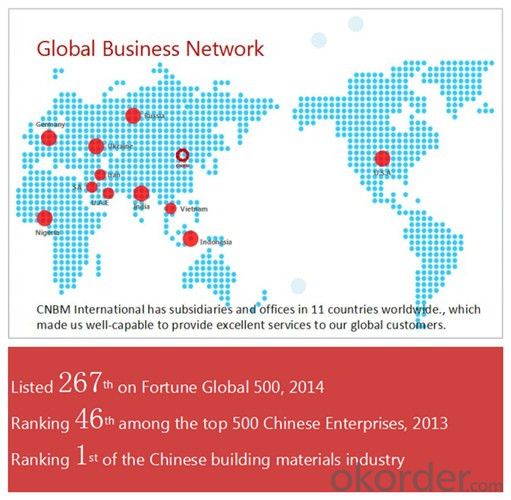
Packaging & Delivery Grade HRB400_HRB400E Deformed Steel Bars Prices
Packaging Detail | Sea worthy packing /as per customer's packing instruction |
Delivery Detail | 15 ~ 40 days after receiving the deposit |
Products Show
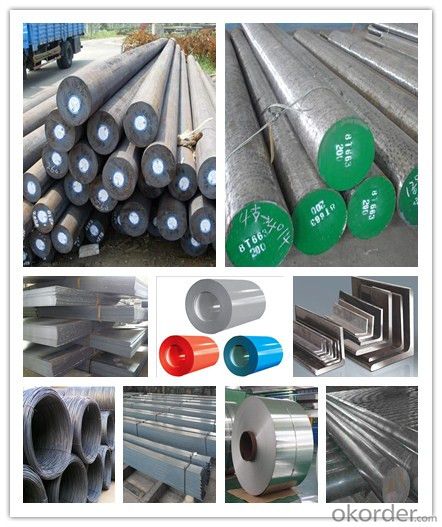
FAQ:
Are you a trading company or manufacturer? | Manufacturer |
What’s the MOQ? | 3 metric ton |
What’s your delivery time? | 15-35 days after downpayment received |
Do you Accept OEM service? | Yes |
what’s your delivery terms? | FOB/CFR/CIF |
What's the Payment Terms? | 30% as deposit,70% before shipment by T/T |
Western Union acceptable for small amount. | |
L/C acceptable for large amount. | |
Scrow ,Paybal,Alipay are also ok | |
Why choose us? | Chose happens because of quality, then price, We can give you both. Additionally, we can also offer professional products inquiry, products knowledge train (for agents), smooth goods delivery, excellent customer solution proposals. |
What's your available port of Shipment? | Main Port, China |
What’s your featured services? | Our service formula: good quality+ good price+ good service=customer's trust
|
Where are your Market? | Covering more than 160 countries in the world |
- Q:What is the impact of impurities on the properties of special steel?
- The presence of impurities in special steel can have a significant impact on its properties. Impurities can weaken the steel's structural integrity, reduce its mechanical strength, and compromise its corrosion resistance. High levels of impurities can also affect the steel's ability to be fabricated or shaped into desired forms. Therefore, it is crucial to minimize impurities during the manufacturing process to ensure that special steel maintains its desired properties and performance characteristics.
- Q:Can special steel be used for cutting tools?
- Yes, special steel can be used for cutting tools. Special steel, such as high-speed steel or tool steel, is specifically designed to have superior hardness, strength, and toughness, making it ideal for cutting applications. These steels can retain their sharpness and withstand high temperatures and mechanical stress, resulting in efficient and durable cutting tools.
- Q:What are the limitations of welding special steel?
- There are several limitations associated with welding special steel. Firstly, special steels often have high carbon content or alloying elements, which can lead to increased susceptibility to cracking during the welding process. Additionally, special steels may have unique microstructures, such as high hardness or brittleness, which can pose challenges in achieving proper weld penetration and joint strength. Furthermore, the heat input required for welding special steels can result in distortion or warping of the workpiece, requiring additional post-welding processes to correct. Finally, special steels may require specific pre-welding preparations, such as preheating or special welding consumables, which can increase the complexity and cost of the welding process.
- Q:What are the different wear-resistant grades of special steel?
- There are several different wear-resistant grades of special steel available, each with their unique properties and applications. Some of the commonly used grades include: 1. D2 Steel: This grade of steel is known for its high wear resistance and excellent toughness. It is often used in the manufacturing of cutting tools, punches, and dies. 2. M2 Steel: M2 steel is a high-speed steel with exceptional wear resistance and heat resistance. It is commonly used in the production of drill bits, milling cutters, and other tools that require high hardness and wear resistance. 3. A2 Steel: A2 steel is a versatile grade known for its excellent wear resistance and toughness. It is frequently used in the manufacturing of cold work tools, such as blanking dies and gauges. 4. O1 Steel: O1 steel is an oil-hardening tool steel with good wear resistance and dimensional stability. It is commonly used in the production of blades, punches, and other cutting tools. 5. S7 Steel: S7 steel is a shock-resistant grade with high wear resistance. It is often used in the manufacturing of chisels, shear blades, and other tools that require resistance to impact and wear. 6. AR400 Steel: AR400 steel is a specific type of abrasion-resistant steel with a hardness of around 400 Brinell. It is frequently used in heavy-duty applications such as mining equipment, bulldozer blades, and dump truck bodies. These are just a few examples of the different wear-resistant grades of special steel available in the market. The choice of grade depends on the specific requirements of the application, such as the type and intensity of wear, operating conditions, and desired hardness. Consulting with a steel supplier or expert can help in selecting the most suitable grade for a particular application.
- Q:Can special steel be used for nuclear power plant components?
- Yes, special steel can be used for nuclear power plant components. Special steel alloys, such as stainless steel or low alloy steel, are commonly used in the construction of various components in nuclear power plants due to their high strength, corrosion resistance, and ability to withstand high temperatures and radiation exposure. These properties are crucial for ensuring the safety and longevity of nuclear power plants.
- Q:What is the purpose of cold drawing in special steel production?
- Cold drawing is utilized in special steel production with the aim of enhancing the mechanical properties and dimensional accuracy of the steel. This technique involves pulling the steel through a die at room temperature, which leads to a reduction in the cross-sectional area and an increase in the length of the steel. By undergoing this process, the microstructure of the steel is refined, resulting in improved strength, hardness, and toughness. Furthermore, cold drawing has the ability to improve the surface finish and straightness of the steel, ensuring precise dimensions and making it suitable for a wide range of applications that require high-quality steel. In summary, cold drawing plays a vital role in improving the performance and quality of special steel, making it more dependable and efficient in various industrial sectors.
- Q:How does special steel perform in low-temperature environments?
- Special steel, also known as low-temperature steel, is specifically designed to perform exceptionally well in low-temperature environments. One of the key features of special steel is its ability to maintain its strength and toughness even at extremely low temperatures. This is crucial in industries such as oil and gas, where equipment and structures are exposed to extreme cold conditions. When exposed to low temperatures, regular steel tends to become brittle and lose its mechanical properties, making it prone to cracking and failure. However, special steel is formulated with specific alloying elements, such as nickel, chromium, and molybdenum, which enhance its low-temperature performance. These alloying elements help to prevent the formation of brittle phases, which allows the steel to retain its toughness and ductility even at sub-zero temperatures. Special steel is extensively used in cryogenic applications, where temperatures can reach as low as -196 degrees Celsius (-320 degrees Fahrenheit). It is commonly employed in the construction of cryogenic storage tanks, liquefied natural gas (LNG) carriers, and other components that come into contact with extremely cold fluids or gases. In low-temperature environments, special steel not only maintains its mechanical properties but also exhibits excellent resistance to corrosion. This is vital, as low temperatures can exacerbate corrosion issues in many materials. The corrosion resistance of special steel is attributed to its high nickel content, which forms a protective oxide layer that prevents the steel from corroding, even in harsh conditions. Overall, special steel is specifically engineered to withstand the challenges posed by low-temperature environments. Its ability to retain strength, toughness, and corrosion resistance makes it an ideal choice for various industries operating in extreme cold conditions.
- Q:How does special steel contribute to the machinability of products?
- Special steel plays a significant role in enhancing the machinability of products. Machinability refers to the ease with which a material can be cut, drilled, or shaped using various machining processes. Special steel, also known as alloy steel, is specifically formulated to contain certain elements that improve its machinability characteristics. One key aspect of special steel that contributes to its enhanced machinability is its composition. By incorporating alloying elements such as manganese, sulfur, and phosphorus, special steel achieves improved machinability compared to regular carbon steel. These elements help in reducing friction during machining operations, resulting in reduced tool wear and extended tool life. Additionally, the presence of these elements facilitates the formation of smaller and more manageable chips during cutting, making it easier to control the machining process and maintain dimensional accuracy. Moreover, special steel often undergoes specific heat treatment processes, such as annealing or quenching and tempering, to further enhance its machinability. Heat treatment improves the steel's microstructure, making it more uniform and refined, which in turn improves its machinability characteristics. Heat-treated special steel exhibits better hardness, toughness, and resistance to wear, all of which are crucial for achieving high-quality machined products. Furthermore, special steel can be engineered to possess other desirable properties, such as high strength, corrosion resistance, or heat resistance, while still maintaining good machinability. This versatility allows manufacturers to select the most suitable special steel for their specific machining applications, ensuring optimal performance and productivity. In conclusion, special steel significantly contributes to the machinability of products due to its specific composition, heat treatment processes, and versatile properties. By utilizing special steel, manufacturers can achieve better machining performance, improved tool life, and higher dimensional accuracy, ultimately leading to superior quality products.
- Q:How does special steel perform in high-temperature creep resistance?
- Special steel has excellent performance in high-temperature creep resistance. It is specifically designed to withstand prolonged exposure to elevated temperatures without undergoing excessive deformation. This is achieved through the addition of alloying elements and a careful heat treatment process, which help to enhance the steel's strength, stability, and resistance to creep. Special steel's superior creep resistance makes it a reliable choice for applications that involve high temperatures and long-term stress, ensuring the structural integrity and durability of the material.
- Q:How is stainless steel used in the food and beverage industry?
- Stainless steel is widely used in the food and beverage industry due to its unique properties. It is corrosion-resistant, easy to clean, and does not impart any taste or odor to the food or beverage being prepared or stored. Stainless steel is used in various applications such as food processing equipment, storage tanks, utensils, and even in the construction of kitchen appliances. Its hygienic nature and durability make it an ideal choice for maintaining food safety standards and ensuring the quality of products in the industry.
1. Manufacturer Overview |
|
|---|---|
| Location | |
| Year Established | |
| Annual Output Value | |
| Main Markets | |
| Company Certifications | |
2. Manufacturer Certificates |
|
|---|---|
| a) Certification Name | |
| Range | |
| Reference | |
| Validity Period | |
3. Manufacturer Capability |
|
|---|---|
| a)Trade Capacity | |
| Nearest Port | |
| Export Percentage | |
| No.of Employees in Trade Department | |
| Language Spoken: | |
| b)Factory Information | |
| Factory Size: | |
| No. of Production Lines | |
| Contract Manufacturing | |
| Product Price Range | |
Send your message to us
Grade HRB400 HRB400E Deformed Steel Bars Prices
- Loading Port:
- Tianjin
- Payment Terms:
- TT or LC
- Min Order Qty:
- 50 m.t.
- Supply Capability:
- 10000 m.t./month
OKorder Service Pledge
OKorder Financial Service
Similar products
New products
Hot products
Hot Searches
Related keywords

